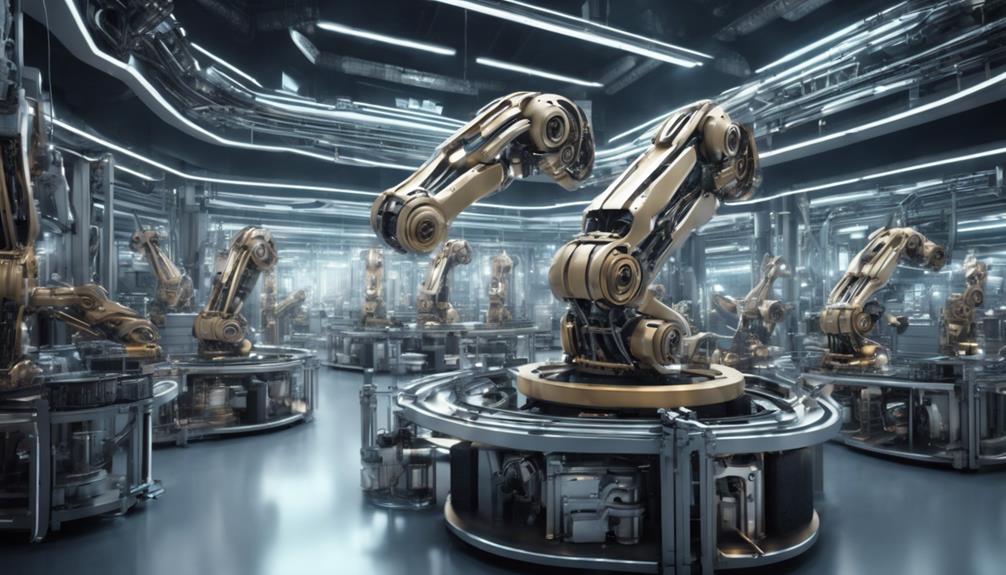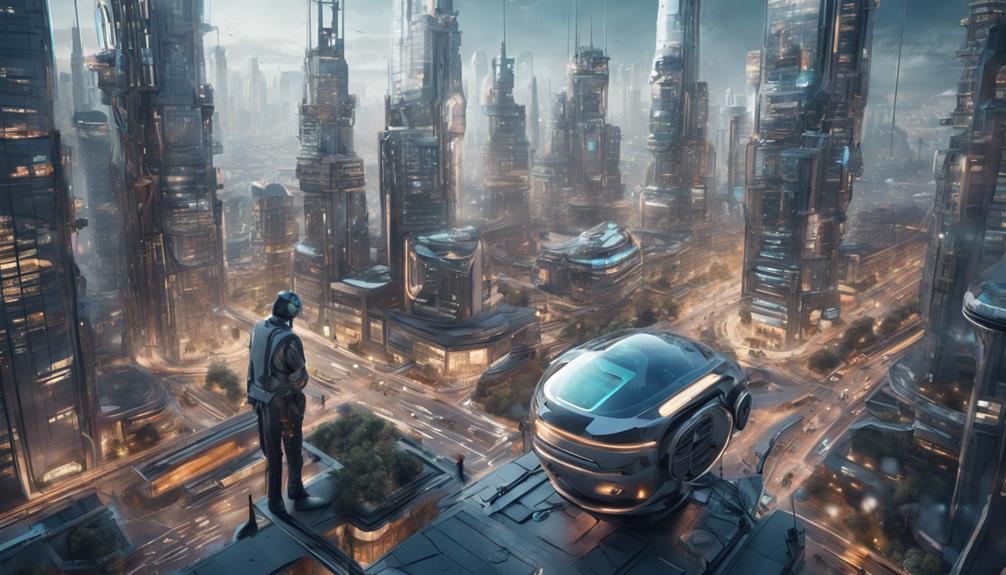As artificial intelligence continues to advance at an unprecedented pace, it is increasingly crucial to discuss its potential impacts on employment.
The looming question of how AI will replace humans in various job roles has sparked both curiosity and concern among professionals across all sectors.
Understanding the nuances of this transition, from the jobs most susceptible to automation to the skills that will be in high demand, is essential for individuals and organizations preparing for the future of work.
The intricate interplay between AI technology and human capabilities presents a complex landscape that necessitates exploration and thoughtful consideration.
Key Takeaways
- AI will replace roles like customer service reps, drivers, and programmers.
- Jobs requiring emotional intelligence are less likely to be replaced.
- AI integration enhances efficiency but struggles with complex human emotions.
- Human skills like creativity and empathy remain crucial in many occupations.
Jobs AI Will Replace
With the rapid advancements in artificial intelligence (AI), the imminent replacement of human jobs across various industries looms as a significant outcome of technological progression. AI, driven by machine learning algorithms, is increasingly becoming capable of performing tasks that were once solely the domain of human intelligence.
Jobs such as customer service representatives, car and truck drivers, computer programmers, research analysts, and paralegals are at risk of being substituted for by AI systems. For instance, automation and chatbots are gradually assuming the role of customer service representatives in handling inquiries. Additionally, the rise of autonomous vehicles is diminishing the necessity for human drivers, thereby affecting jobs in the transportation sector.
Moreover, generative AI tools like ChatGPT have demonstrated the potential to automate coding tasks, impacting the field of computer programming. As AI continues to evolve, its capacity to augment human intelligence while simultaneously acting as a substitute for human labor in specific tasks is becoming increasingly evident.
Jobs AI Won't Replace

In the realm of occupations resistant to automation by AI, roles that demand high levels of emotional intelligence and interpersonal skills stand out as compelling examples. These professions require a deep understanding of human interaction, making them less susceptible to being overtaken by artificial intelligence.
Three key reasons why these jobs are unlikely to be replaced by AI include:
- Emotional Intelligence: Occupations that rely heavily on emotional intelligence, such as therapists and counselors, involve complex human emotions and responses that AI struggles to comprehend fully.
- Creativity and Critical Thinking: Jobs that necessitate creativity and critical thinking, like artists and designers, demand a level of innovation and abstract reasoning that current AI technologies find challenging to replicate.
- Empathy and Personal Connections: Roles that prioritize empathy, intuition, and personal connections, such as teachers and social workers, require a deep understanding of individual needs and emotions, aspects that AI currently lacks the capability to emulate effectively.
These occupations, where human touch, adaptability, and personal relationships are central, are poised to remain predominantly human-driven due to the unique qualities and skills they demand.
Benefits of AI in the Workplace
AI integration in the workplace offers a multitude of advantages that streamline operations and enhance workforce capabilities. By leveraging Artificial Intelligence (AI), businesses can significantly boost efficiency and productivity by automating repetitive tasks, allowing employees to focus on more strategic initiatives. This shift not only enhances job roles, creating opportunities in fields like machine learning engineering and AI ethics, but also encourages innovation and creativity among human workers. Human-AI collaboration becomes essential as employees are tasked with training, maintaining, and monitoring AI systems, emphasizing the synergy between technology and human expertise. To illustrate the benefits further, consider the following comparison table:
| Benefits of AI in the Workplace |
|---|
| Automates tedious tasks |
| Creates new job roles |
| Enhances innovation and creativity |
| Improves efficiency in operations |
| Fosters human-AI collaboration |
How AI Will Create Jobs

The evolution of Artificial Intelligence in the workplace not only streamlines operations and enhances workforce capabilities but also paves the way for the creation of numerous new job opportunities on a global scale. As AI continues to advance, it brings forth a wave of job creation across various industries and disciplines. Here are three key ways in which AI will generate employment:
- Diversification of Roles: AI will create positions such as AI trainers, AI ethicists, and data scientists, necessitating human expertise to guide and supervise AI systems effectively.
- Specialized Job Opportunities: The integration of AI into business processes will spur the demand for professionals focused on AI implementation and optimization, opening up new career paths in this specialized field.
- Industry-specific Growth: Sectors like autonomous vehicles and robotics are poised to offer significant job opportunities as they embrace AI technologies, highlighting the potential for growth in emerging fields driven by artificial intelligence.
Skills for the AI Age
Exploring the essential competencies required to thrive in the era of Artificial Intelligence reveals a landscape where proficiency in data manipulation, natural language processing (NLP), and deep learning techniques reign supreme. In this AI age, humans must adapt to leverage AI tools effectively and complement their human intelligence with AI capabilities. The ability to process vast amounts of data and extract meaningful insights is crucial for individuals looking to stay relevant in a world where AI is increasingly integrated into a wide range of tasks.
Human creativity remains a distinctive trait that sets us apart from machines. While AI can assist in automating repetitive tasks and optimizing processes, human beings bring innovative thinking and creative problem-solving skills to the table. Therefore, honing skills that enhance human creativity alongside technical competencies is essential for navigating the evolving landscape of AI-driven industries.
In essence, mastering the skills required in the AI age involves a strategic blend of technical expertise, adaptability, and a deep understanding of both human and artificial intelligence. By embracing these competencies, individuals can position themselves as valuable assets in a workforce where human ingenuity continues to be a driving force behind AI innovation.
Frequently Asked Questions
How AI Will Change Human Life?
AI is set to revolutionize human life by automating tasks, enhancing efficiency, and unlocking new possibilities across industries. From customer service to transportation and coding, AI's transformative impact heralds a future of innovation and change.
Will a Person Using AI Replace You?
The evolution of AI presents a transformative force in various industries, raising questions about the potential replacement of human roles. As technology advances, the integration of AI may alter the landscape of work, challenging traditional notions of employment.
What Will Happen to Humans if AI Takes Over?
Should AI take over, humans must adapt, focusing on creative, emotionally intelligent, and critical tasks. The shift entails collaboration with AI for enhanced productivity. While some job functions may change, human roles may evolve, leading to a more efficient workforce.
What Jobs Will Not Be Replaced by Ai?
Professions reliant on personal interactions, emotional intelligence, and creativity, such as teaching, nursing, therapy, and skilled trades, are less susceptible to AI replacement. These roles demand nuanced human touch and complex decision-making, safeguarding them from automation.
Conclusion
In the ever-evolving landscape of work, AI serves as a double-edged sword, capable of both replacing and creating jobs. As industries adapt to the advancements in technology, the collaboration between humans and AI becomes paramount.
Like a symphony conductor guiding a diverse orchestra, the harmonious interaction between humans and AI will orchestrate a new era of work, where efficiency and innovation coexist.









